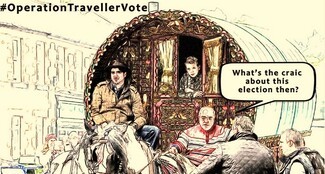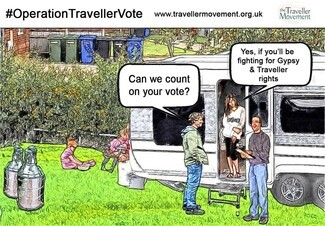Operation Traveller Vote 2018

The Traveller Movement relaunches their Operation Traveller Vote campaign ahead of next month’s local elections. Here’s why it’s so important that Gypsies, Roma and Travellers get out to vote on Thursday 3rd May 2018.
Our campaign Operation Traveller Vote was launched in 2014 and it has been going ever since. Its aim is simple; to increase the number of Gypsies, Roma and Travellers registered to vote, who then go on to vote and who are politically engaged.

The reluctance of many people, including some in GRT communities, to vote or to engage in politics is understandable. General feelings of distrust and hopelessness towards politicians are common. On top of this, lots of Gypsies and Travellers have had negative experiences or heard negative stories, especially when it comes to sites or other tensions that local politicians will often not help with. Historically, discrimination against GRT people has been terrible, with laws demonising Gypsies in particular (such as the 1554 Egyptians Act which made just being a Gypsy a criminal offence). Nowadays, the discrimination is more subtle yet still damaging. Some (though it’s important to remember, not all) politicians still promote a negative view of GRT people, often with little cultural understanding of the communities in the first place.
However, the main message of Operation Traveller Vote is not to lose faith and to always, always vote. If you are having problems working out who would best represent you, it’s best to speak to those in your area about who is running for councillor or better yet, speak to those running for yourself. If you’re not sure about what to say, think of some questions beforehand or ask one of our three key questions:
- Do you support building more sites for local Gypsies and Travellers?
- Will you support the celebration of Gypsy, Roma and Traveller History Month in June in our local schools?
- What will you do to campaign for the fair and equal treatment of Gypsies, Roma and Travellers, and to end discrimination towards them?
If enough Gypsies, Roma and Travellers make it known that they intend to vote then politicians, especially local politicians, will listen. The simple fact of it is that if politicians don’t think a group of people will vote, then they won’t feel the need to find out what that group want.
At a local election, politicians know that every vote counts even more because the numbers voting in the first place are so small. This means that if you let the candidate in your area know that you and a number of other Gypsies, Roma or Travellers are planning to vote, they are likely to be very interested in hearing what you have to say and what you want.

And that is why the local election on May 3rd is so important. These elections will decide the local councillors that have power over issues such as planning and providing sites. They are also there to help you with other local things such as waste collection, issues with specific schools, the condition of roads, and any other problems you might have.
Since 2014, we have seen and heard the stories of so many first time voters. This needs to continue to make sure that politicians take GRT issues seriously. If you still have questions about registering to vote, you can find out more about it here on the fact sheet we created in partnership with the Electoral Commission or you can go to our website to find out more information about the campaign http://travellermovement.org.uk/operationtravellervote/.
Remember, minorities can make a difference! In the general election last year, if ethnic minorities across the country had voted for the Conservative party in the same numbers as white British people did, then they could have won an extra 28 seats. This would have won them the election overall and it proves that all of us have some power, as long as we actually use our right to vote.
You have until Tuesday 17th April to register to vote, if you haven’t done so already. You will need to register through this link https://www.gov.uk/register-to-vote. You will need your National Insurance number or passport, if you have them.